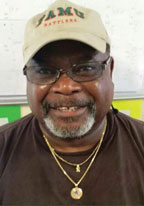 St. Pete, gone on to compete on higher grounds
St. Pete, gone on to compete on higher grounds
By Shakey Daddy Monroe
Sometimes it takes greatness to recognize greatness.
Robert G. “St. Pete” Williams passed away on March 7. He was 64.
He is remembered as one of the most exciting running backs in Dillard High School history.
“St. Pete was one of the best athletes, not only in Broward County, but in South Florida,” said Rubin Carter, a former NFL and collegiate standout. “He was just a natural athlete and had tremendous speed. He’ll be truly missed.”
Funeral services will be held for Williams on Saturday morning, March 19, 2016 at 11 a.m. The wake is Friday at Roy Mizell & Kurtz Funeral Home in Fort Lauderdale.
That’s quite a compliment, because Carter has played against some of the best football players on every level. Carter, a Stranahan High graduate, is among the most heralded football players in Broward County history. He was an All-American defensive tackle at the University of Miami and played 12 seasons for the Denver Broncos.
Carter was saddened by the passing of Williams. They were friends and enjoyed playing against each other, because it featured the top running back in the county against the top defensive lineman.
A TRUE COMPETITOR
Carter praised Williams for his toughness on the field.
“We called him St. Pete,” Carter said. “But I called him COMPETE.
“That’s what he would do (compete) and he would always bring his A-Game. He had a tremendous personality about him and a work ethic and the way he carried himself. You’d always have the greatest a-mount of respect for him because of that.”
Even though, the Dillard-Blanche Ely rivalry is the most talked about rivalry within the Black community, Carter and other Fort Lauderdale locals had their own rivalries among neighborhoods friends. It pitted Dillard against Stranahan and Fort Lauderdale High.
Stranahan and Fort Lauderdale had integrated in the late 60’s but Dillard didn’t integrate until the fall of 1971. The Panthers last all-Black graduating class was the Class of 1972.
So it was more than just another football game whenever Dillard played Stranahan or Fort Lauderdale High, according to Carter.
“Those games would always end up 7-6,” Carter said of playing against Dillard. “But you have to remember that it was a rivalry because a lot of those guys we knew because of Ever-glades (junior high).
“It was just because of forced busing that we had to go to other schools. So it was always competitive and we enjoyed it . . . myself, Willie Turner and H.L. Coleman and we really enjoyed competing against Dillard. But definitely Robert Williams was one of the best athletes and a better person.”
Neither segregation nor integration could slow down Williams.
He broke tackles and outran defenders, no matter what color the defense was. Williams caused many defensive coordinators to lose sleep devising ways to stop this elusive running back.
It didn’t take long for long-time Dillard coach Ted Primus to figure out how to utilize the running skills of Williams. Primus followed a blueprint similar to Woody Hayes . . . keep running the football.
Hayes, the legendary Ohio State football coach, believed in three yards and a cloud of dust football. Primus opted for three more carries for St. Pete. It was St. Pete to the left; St. Pete to the right; and St. Pete up the middle.
Williams delivered each time.
Thad Starling, former Florida A&M football standout and Hall of Fame candidate, is a second-cousin to Williams. They were raised together in St. Petersburg, Fla., and remained close even after Williams moved to Fort Lauderdale to live with his father during his sophomore year in high school.
“Everybody loved him,” Starling said. “He was about the nicest guy in the world.
“He’d give you the shirt off his back. If he had money and you didn’t have any money . . . both of y’all would have money.
“We grew up like brothers. When he was in the crib, they laid me in the crib with him. He had a bottle. I had a bottle. When he finished a bottle, he took my bottle. When I finished a bottle, I took his bottle. He drank some and I drank some. He was four months older . . . but I was bigger.”
Starling chatted with Williams less than an hour before his untimely passing. Starling called to wish Williams a happy birthday. He passed less than an hour later.
PINK SLIP
Starling’s most found memory of Williams dates back to when they were 10th graders. Starling would spend part of the summer in Fort Lauderdale with Williams. They got a job working for a roofing company. It was short-lived.
“They wanted us to take hot buckets of tar up to the roof on a ladder,” Starling chuckled. “We started the job at 6 a.m. and was fired at 6:15.”
Funeral arrangements for Robert G. Williams: Wake: Friday March 18 Roy Mizell & Kurtz Funeral Home 1305 NW 6th St, Fort Lauderdale, FL 33311. Homegoing Services 10 a.m. The House of God Church Pompano 400 NW 18th Ave. Pompano Beach, Fla. Repast McBride Lodge AF&M #390 1121 N.W. 5th St. Fort Lauderdale, Fla.
